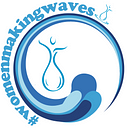#womenmakingwaves — Community Decision-Making Results in Sustainable WASH Solutions
COMMUNITY MUST BE INVOLVED ALL WASH PROJECTS
Community decision-making can be one of the key factors of success around any water development project. All over the world in communities of need, you’ll find systems that are functioning with ease and in others, the carcass of broken pumps, unused toilets, tanks in disrepair and the list goes on and on. A major contribution to the failure of these systems has been outsiders — not actually living in the community — deciding where to build and what to build, and not offering any local training for the construction, maintenance or repair of imposed systems. The result is that when these foreign systems breakdown, local people don’t have the capacity to repair or revitalize the projects leading to project failure.
Charity Nduhura and Afuwa Ngobi from Ugandan based Women’s Center for Job Creation know the importance of community engagement. With the support of Executive Director, Dorothy Tuma, Charity and Afuwa came to Global Women’s Water Initiative (GWWI)through a recommendation from our friends at Global Fund For Women. WCFJC implements projects to equip low-income women in expanding the scale of their existing income generating projects.
Charity and Afuwa participated in GWWIs Women’s Water Leadership Academy where they learned how to build a rainwater harvesting systems with a storage tank. They brought the technology back to the women they work with in the community of Butagaya, Jinja in Uganda. These women, who had started micro-businesses raising poultry and goats in Butagaya, knew rainwater harvesting systems were an important and much needed technology for their families and businesses. So, after their return from the training, Charity and Afuwa’s first action was to work with the Butagaya community to identify the most appropriate construction sites where all community members had easy access to the water — a location that also was easy to maintain.
Realizing the importance of community ownership, Charity and Afuwa used part of their GWWI $1,500 seed grant to organize a leadership workshop and construction training (conducted by GWWI training partner Connect Africa) to transfer the knowledge they learned at the GWWI training to the community. Participants of this community training showed up nearly every day for 2 weeks to learn how to build 2 rainwater harvesting systems — each 10,000 liter ISSB tanks (interlocking stabilized soil bricks). A maintenance committee was formed and the community created a water access and distribution plan, appropriate to their needs. As a result of Charity, Afuwa and the Butagaya community’s hard work, hundreds of people in their community have now been impacted and these grassroots-training participants now have tools to not only address their local water needs, but also earn additional income by building tanks. The WCFJC members are now talking about wanting to build toilets!
JOIN us as we support women who are changing the course of water in Africa! Follow us on our
Website — globalwomenswater.org
